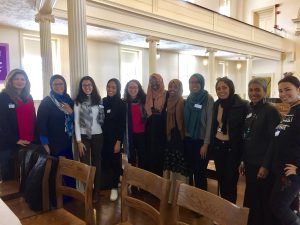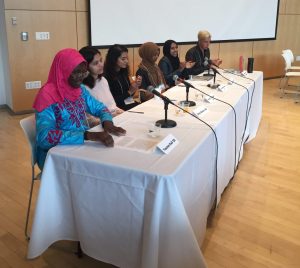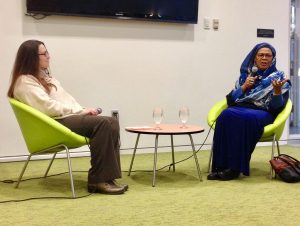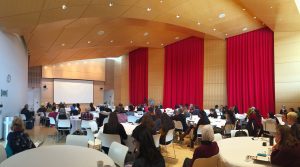“You don’t have to be a voice for the voiceless, just pass the mic.” – Su’ad Abdul Khabeer, Author of Muslim Cool: Race, Religion and Hip Hop in the United States
Smith College is home to a host of students exploring and celebrating different identities. In the midst of grappling with gender, politics, race, ethnicity, and ability, Smith has faced criticism that religious identity isn’t given the space to flourish on campus. This past weekend, the Lewis Global Studies Center and the CRSL hosted a conference titled “Contemporary Women in Islam: Politics and Identity.” Performances, lectures, student panels, and prayer spanned the two-day event, provoking discussion around Islam, feminism, and social justice.
Approaching the event as a white American member of the student body, I attended the Jummah lunch with the intention to listen and learn. It was there, at the Helen Hills Hills Chapel, that the student-led narrative began to emerge. I followed this narrative for the next two days. The mic belonged to Muslim women activists, Smithies, scholars, and artists. Here’s what they had to say.

Dr. Amina Wadud joined Smithies for Jummah Lunch!
Salma Khan ’18 addressed event attendees during the student panel on Saturday. “Political identity is accepted over religious identity,” she said, shining light on the secular culture of the American Academy. At Jummah lunch the day prior, Mariyam Indhar ’18 had noted that “the people [at Smith] who want to talk about religious identity are in the minority. That can make it hard to have constructive dialogue.” So what can be done to expand the space for religious identity at Smith? Alum Falak Koreshi ’17 suggested that while students need to push to cultivate these conversations, there needs to be more outreach from the administration to the students. It can be difficult to know where to start when seeking knowledge about religion; nobody wants to overstep their boundaries, impose, or tokenize their peers in pursuit of awareness. Su’di Abdirahman ’18 suggests students looking to be a part of the conversation come to the Interfaith Lunch. Su’di is also co-chair of Al Iman, a Muslim Students’ association that creates a place for Muslims and non-Muslims to come together and converse. Meaningful experiences with those different than us nourishes our capacity for growth. Seek out those experiences by attending CRSL-supported groups and events, like Al Iman!

The Smith Student Panel, moderated by
Badriyyah Al-Sabah ’17, addressed event
attendees on Saturday.
On day two of the conference, the Student Panel set a dynamic scene. Salma Khan ’18, Su’di Abdirahman ’18, Zoya Azhar ’20, Enas Jahangir ’18, and Yacine Fall ’21 spoke to the empowerment of Muslim women. Each shared their stories, expressing the diverse manifestations of faith and their Muslim identities.
Salma reflected on how the FBI infiltrated and surveilled her community after 9/11. Tactics used on targeted minorities such as the Black Panthers were now being directed at those close to her. She spoke matter-of-factly to the wiretapping of her family’s phone, and the black car that parked outside of her elementary school playground for six years. Su’di attested to the schism in identity she’s experienced as a Somali woman in the United States. “I am too Somali to be American, and too American to be Somali,” she shared. As a self-assured, educated woman, she says she knows there are people saying “keep an eye on her” in both Somalia and America. So she roots herself proudly in her Muslim identity, the identity she says she has the most control over. Enas examined queerness in Islam, expressing that there is not space for queer Muslims on the Smith campus; that needs to change. Zoya’s speech was titled “My Islam: Before and After America.” Zoya, a Pakistani international student, traced her relationship with Islam from her home country to the United States. She recalled a legal amendment made in Pakistan that would allow men to “lightly beat” their wives. Officials claimed the motion adhered to Islam. Zoya was confused, pained, and determined to invest more wholly in her faith to challenge proclamations like that one. She said that her distance from Pakistan has enhanced her pride in Islam, and helped her to make her religion “her own.” Yacine, a first-year at Smith, closed the panel.
“I am not an activist only because of the oppression of Muslims in the world,” she said, “but because justice is embedded in my my religion.”
You can watch a video of the student panel here.

Dr. Kecia Ali interviewing Dr. Amina Wadud.
Identity is the cornerstone of Smith culture, but those conversations are often secular. For many of us who don’t observe a particular faith, our gender identity, sexual orientation, race, or other aspect of self exists outside of religion. It is a separate sphere. For those devout, these aspects of self are observed through the lens of their faith.
Dr. Kecia Ali, in her interview with Dr. Amina Wadud on the Friday of the conference, addressed this notion. She asked Dr. Wadud what it was like for her to be an African-American Muslim, to “belong and not belong,” depending on location. She replied with a powerful sentiment:
“As an African-American, a Muslim by choice, and a woman, I am connected to the whole world.”
Dr. Amina Wadud is a renowned scholar of gender and Qur’anic studies. In her published works, Qur’an and Woman and Inside the Gender Jihad, Dr. Wadud challenges male-dominant aspects of traditional Islamic thought. In speeches given at grassroots organizations, universities, and governmental forums internationally, Dr. Wadud continues to emphasize the diverse lived realities of Muslim women. She is also the founder of non-governmental activist organization Sisters in Islam.

The Scholar Panel addressed the conference
in the Carroll Room.
Dr. Wadud went on to speak in support of the women-centered, inclusive-Mosque movements across the world. Often commended for being queer-friendly and trans-inclusive, she also encouraged the audience to think about ableism and classism when pushing for inclusivity. Celebration and recognition of diversity was Dr. Wadud’s salient narrative throughout the conference, reiterated by the Smith student panel and other special guests. She closed the interview with an encompassing remark: “Islam—we make it as we live it.”
So let’s push for these conversations! Let’s ask questions; engage our peers in examination of self through the lens of spirituality. Ask your friends how their faith shapes their activism. Attend CRSL-supported events that expand our capacity to learn from one another. As Yacine said,
“Before we can think about the revolutions and changing the world, we need to lay the proper foundations of informing ourselves.”
Click here to see weekly events supported by the Center for Religious and Spiritual Life.
